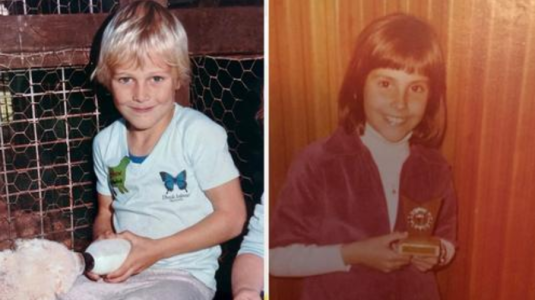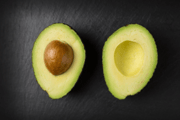Sunrise hosts share childhood photos in an initiative to protect children from abuse
You saw them on TV every morning, but what did the stars of Sunrise look like when they were kids? On Wednesday’s show, co-hosts Nat Barr and Matt Shirvington shared unreleased photos of themselves as children–and we were absolutely blown away by their transformations!
Shirvo’s snap showed him when he was a young boy, wearing a Dunk Island t-shirt and shorts set while he was happily feeding a goat.
Nat looked completely different in her picture, wearing a skivvy dress with her dark hair cut in a bob and fringe style and holding a trophy.
The photos were shared as part of a new initiative by Monash University, supported by the Australian Federal Police (AFP) called ‘My Pictures Matter’.
This world-first crowdsourcing project is part of an effort to help prevent child abuse. The idea is to get adults to submit photos of themselves as children, which will then be used to train artificial intelligence (AI) to detect children in photos and videos across various situations.
AFP Acting Assistant Commissioner Helen Schneider explained to Nat and Shirvo how it works:
'What we’re looking for is a bit of a call to action to all adults in our community for photos from their youth. From these photos, “My Pictures Matter”, we’ll be able to build a really strong database to help train artificial intelligence to detect child abuse material.'
But the initiative also comes with an important caveat–all photos must be of the person submitting them.
'That’s part of the ethical part, the ethical basis of this project,' Ms Schneider said.
'We don’t want to use pictures of children off the internet because they can’t consent to being part of this research project. And we don’t want parents to send in pictures of their children because, once again, they can’t consent.'
Nat and Shirvo said they were keen to ensure they were doing the right thing and then happily agreed to submit their childhood pics 'for a good cause'.
According to the AFP, this new project would save the mental well-being of hundreds of officers regularly exposed to the horrific material.
'This project is so important because it may not only save a child from being abused a day longer, but it also will help our members who day-in, day-out are required to watch children being sexually abused for investigative purposes,' AFP Deputy Commissioner Lesa Gale shared.
For the technology to learn the difference between 'safe' situations and instances of abuse, it needs a database of 100,000 'safe' childhood photos from people of different ethnicities aged from infancy to 17.
‘My Pictures Matter’ Project Head, Dr Nina Lewis, assured that the photos will be managed by the university: 'We can reassure people that this dataset is wholly owned and managed by Monash University, with use by our AFP colleagues subject to the same transparency and accountability measures that apply to all researchers on the team working to combat child abuse.’
'People are also free to withdraw their childhood photos from the dataset if they change their mind,' she added.
It’s really easy to get involved–you just need to visit the ‘My Pictures Matter’ website and upload your picture.
Ms Schneider expressed it was important to make sure there was a lot of variety to the photos– different skin tones, different backgrounds, different eras–to help the AI software recognise children in all types of situations.

What do you think of this story, members? Would you provide your childhood photo for this campaign? Share your thoughts in the comments below!
Shirvo’s snap showed him when he was a young boy, wearing a Dunk Island t-shirt and shorts set while he was happily feeding a goat.
Nat looked completely different in her picture, wearing a skivvy dress with her dark hair cut in a bob and fringe style and holding a trophy.
The photos were shared as part of a new initiative by Monash University, supported by the Australian Federal Police (AFP) called ‘My Pictures Matter’.
This world-first crowdsourcing project is part of an effort to help prevent child abuse. The idea is to get adults to submit photos of themselves as children, which will then be used to train artificial intelligence (AI) to detect children in photos and videos across various situations.
AFP Acting Assistant Commissioner Helen Schneider explained to Nat and Shirvo how it works:
'What we’re looking for is a bit of a call to action to all adults in our community for photos from their youth. From these photos, “My Pictures Matter”, we’ll be able to build a really strong database to help train artificial intelligence to detect child abuse material.'
But the initiative also comes with an important caveat–all photos must be of the person submitting them.
'That’s part of the ethical part, the ethical basis of this project,' Ms Schneider said.
'We don’t want to use pictures of children off the internet because they can’t consent to being part of this research project. And we don’t want parents to send in pictures of their children because, once again, they can’t consent.'
Nat and Shirvo said they were keen to ensure they were doing the right thing and then happily agreed to submit their childhood pics 'for a good cause'.
According to the AFP, this new project would save the mental well-being of hundreds of officers regularly exposed to the horrific material.
'This project is so important because it may not only save a child from being abused a day longer, but it also will help our members who day-in, day-out are required to watch children being sexually abused for investigative purposes,' AFP Deputy Commissioner Lesa Gale shared.
For the technology to learn the difference between 'safe' situations and instances of abuse, it needs a database of 100,000 'safe' childhood photos from people of different ethnicities aged from infancy to 17.
‘My Pictures Matter’ Project Head, Dr Nina Lewis, assured that the photos will be managed by the university: 'We can reassure people that this dataset is wholly owned and managed by Monash University, with use by our AFP colleagues subject to the same transparency and accountability measures that apply to all researchers on the team working to combat child abuse.’
'People are also free to withdraw their childhood photos from the dataset if they change their mind,' she added.
It’s really easy to get involved–you just need to visit the ‘My Pictures Matter’ website and upload your picture.
Ms Schneider expressed it was important to make sure there was a lot of variety to the photos– different skin tones, different backgrounds, different eras–to help the AI software recognise children in all types of situations.
Key Takeaways
- Sunrise hosts Nat Barr and Matt Shirvington shared childhood photos of themselves as part of Monash University and the Australian Federal Police’s (AFP) campaign against child abuse.
- The AFP is calling on Australians to submit their childhood pictures to assist in the fight against child abuse and help solve cases through a new initiative called ‘My Pictures Matter’.
- The submitted images will be used to train AI software to detect children in photos and videos across a range of situations.
- Acting Assistant Commissioner Helen Schneider emphasised the importance of people only submitting photos of themselves, to ensure the ethical aspect of the research project, as children cannot provide consent.
What do you think of this story, members? Would you provide your childhood photo for this campaign? Share your thoughts in the comments below!
Last edited:








